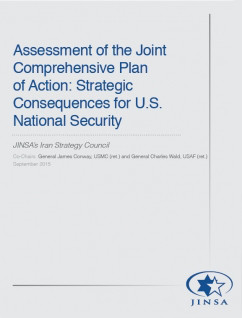
JINSA, September 2015
http://www.jinsa.org/iran-strategy-council/assessment-jcpa
The final agreement on Iran’s nuclear program, the Joint Comprehensive Plan of Action (JCPOA), has potentially grave strategic implications that directly threaten to undermine the national security of the United States and our closest regional allies. By allowing Iran to become a nuclear threshold state and enabling it to become more powerful and expand its influence and destabilizing activities – across the Middle East and possibly directly threatening the U.S. homeland – the JCPOA will place the United States in far worse position to prevent a nuclear Iran. This study aims to analyze and understand the likely impact of these consequences on U.S. national security, to help policymakers craft and implement a response.
We assess:
- The JCPOA will not prevent a nuclear Iran. No later than 15 years, the deal’s major nuclear restrictions will lapse, Iran will stand on the brink of nuclear weapons capability, and once again the United States will likely have to devote significant resources and attention to keeping Tehran from attaining nuclear weapons.
- The JCPOA will enable Iran to increase support for terrorist and insurgent proxies, aggravate sectarian conflict and trigger both nuclear and conventional proliferation cascades. It will provide the expansionist regime in Tehran with access to resources, technology and international arms markets required to bolster offensive military capabilities in the vital Persian Gulf region, acquire long-range ballistic missiles and develop other major weapons systems.
- Our long-standing allies feel betrayed – even angry – with the JCPOA, seeing it as a weakening of U.S. security guarantees and reversal of decades of U.S. regional security policy. The mere fact that such perceptions persist, regardless of their veracity, will undermine U.S. credibility, threatening to turn them into a self-fulfilling prophecy.
- Simultaneously, sequestration is diminishing the ability of the United States to respond to Iranian aggression, mitigate security threats emanating from Iran and protect U.S. regional allies. Leaving it with fewer and older ships and planes as well as fewer and less well-trained troops, these cuts will severely damage the U.S. military’s ability to project power in the region, even as the Iranian threat grows.
- The United States is in a far better position to prevent a nuclear Iran today, even by military means if necessary, than when the JCPOA sunsets. The strategic environment will grow much more treacherous in the next 15 years. Comparatively, Iran will be economically stronger, regionally more powerful and militarily more capable, while the United States will have a smaller, less capable fighting force, diminished credibility and fewer allies.
Contrary to the false choice between support for the JCPOA and military confrontation, the agreement increases both the probability and danger of hostilities with Iran. Given the deleterious strategic consequences to the United States, implementation of the JCPOA will demand increased political and military engagement in the Middle East that carries significantly greater risks and costs relative to current planning assumptions.
